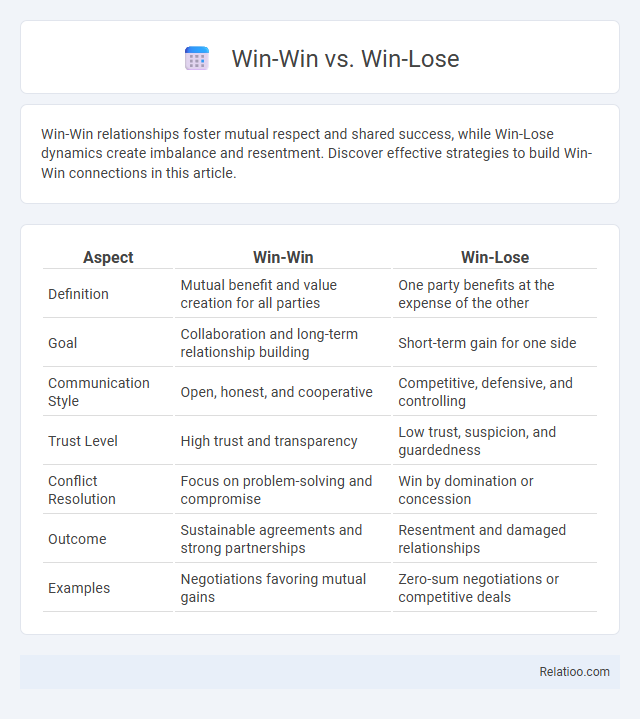Win-Win relationships foster mutual respect and shared success, while Win-Lose dynamics create imbalance and resentment. Discover effective strategies to build Win-Win connections in this article.
Table of Comparison
| Aspect | Win-Win | Win-Lose |
|---|---|---|
| Definition | Mutual benefit and value creation for all parties | One party benefits at the expense of the other |
| Goal | Collaboration and long-term relationship building | Short-term gain for one side |
| Communication Style | Open, honest, and cooperative | Competitive, defensive, and controlling |
| Trust Level | High trust and transparency | Low trust, suspicion, and guardedness |
| Conflict Resolution | Focus on problem-solving and compromise | Win by domination or concession |
| Outcome | Sustainable agreements and strong partnerships | Resentment and damaged relationships |
| Examples | Negotiations favoring mutual gains | Zero-sum negotiations or competitive deals |
Understanding Win-Win and Win-Lose Dynamics
Win-Win dynamics foster collaboration where both parties achieve mutual benefits, enhancing long-term relationships and trust. In contrast, Win-Lose scenarios create power imbalances, often leading to resentment and ongoing conflicts. Understanding these dynamics helps you choose strategies that emphasize cooperation over competition for effective conflict resolution.
Core Principles of Win-Win Negotiation
Win-win negotiation centers on collaboration, mutual respect, and creating value for all parties involved, ensuring that both sides achieve beneficial outcomes without sacrificing their core interests. This approach contrasts with win-lose scenarios where one party's gain comes at the expense of another, often leading to strained relationships and recurring conflicts. By focusing on open communication, understanding underlying needs, and fostering trust, your negotiation efforts align with sustainable conflict resolution and lasting agreements.
Key Traits of Win-Lose Outcomes
Win-lose outcomes are characterized by competition where one party's gain results in another's loss, often fostering resentment and damaging long-term relationships. Key traits include a zero-sum mindset, prioritizing personal success over collaboration, and limited communication, which can escalate conflicts rather than resolve them. Understanding these traits allows you to recognize when a situation requires a shift toward more cooperative conflict resolution strategies for sustainable results.
Psychological Impact on Parties Involved
Win-win conflict resolution fosters mutual respect and strengthens relationships by ensuring that all parties' needs are acknowledged, leading to increased psychological well-being and reduced stress. Win-lose scenarios often cause feelings of resentment, anxiety, and decreased self-esteem in the losing party, which can result in long-term emotional damage and impaired trust. Your approach to resolving conflicts significantly influences the psychological health of those involved, making a win-win strategy essential for sustainable, positive outcomes.
Real-World Examples: Win-Win vs Win-Lose
In business negotiations, a Win-Win approach fosters mutual benefit, such as when Apple and Samsung collaborate on component supply while competing in the smartphone market. Win-Lose scenarios often appear in competitive bidding, where one company secures the contract at the expense of others, sparking potential conflicts. Your ability to identify when to apply Win-Win strategies versus Win-Lose tactics is crucial for long-term success and sustainable conflict resolution.
Communication Strategies for Win-Win Solutions
Effective communication strategies for win-win solutions emphasize active listening, empathy, and open dialogue to ensure all parties feel heard and valued. You can foster collaboration by focusing on shared interests rather than positions, promoting problem-solving that benefits everyone involved. Using clear, respectful language and asking open-ended questions enhances mutual understanding and builds trust critical for sustainable conflict resolution.
Common Pitfalls Leading to Win-Lose Results
Common pitfalls leading to win-lose results in conflict resolution include poor communication, lack of empathy, and rigid negotiation tactics that prioritize one party's interests over mutual benefit. Failing to explore underlying needs and focusing solely on positions often escalates conflicts, creating zero-sum outcomes where one side wins at the other's expense. Effective conflict resolution requires collaborative problem-solving and openness to shared gain rather than competitive dominance.
Benefits of Adopting a Win-Win Mindset
Adopting a win-win mindset fosters collaborative problem-solving, leading to mutually beneficial outcomes that strengthen relationships and increase long-term trust. Unlike win-lose scenarios, where one party's gain results in another's loss, win-win approaches promote innovation and shared success by valuing diverse perspectives. Conflict resolution grounded in win-win principles reduces resentment and repeated disputes, enhancing team cohesion and overall productivity.
Transforming Conflicts into Collaborative Opportunities
Transforming conflicts into collaborative opportunities requires shifting from a Win-Lose mindset to a Win-Win approach, where both parties actively seek mutually beneficial solutions. Your ability to engage in open communication and empathy turns disagreements into problem-solving sessions, fostering trust and innovation. This method enhances long-term relationships and creates value by aligning interests rather than competing against each other.
Long-Term Implications for Relationships and Success
Win-win conflict resolution fosters sustainable relationships and long-term success by promoting mutual respect, trust, and collaboration, which enhances cooperation and future problem-solving. In contrast, win-lose approaches often damage relationships through resentment and power struggles, leading to decreased collaboration and repeated conflicts over time. Conflict resolution strategies prioritizing win-win outcomes are essential for maintaining healthy partnerships, boosting morale, and creating a foundation for continuous growth and shared success.

Infographic: Win-Win vs Win-Lose
 relatioo.com
relatioo.com